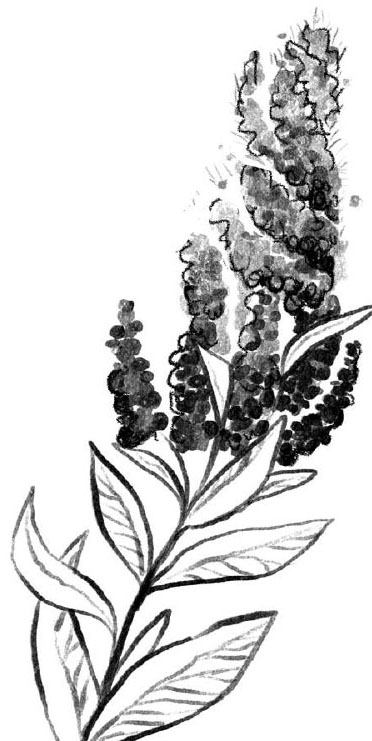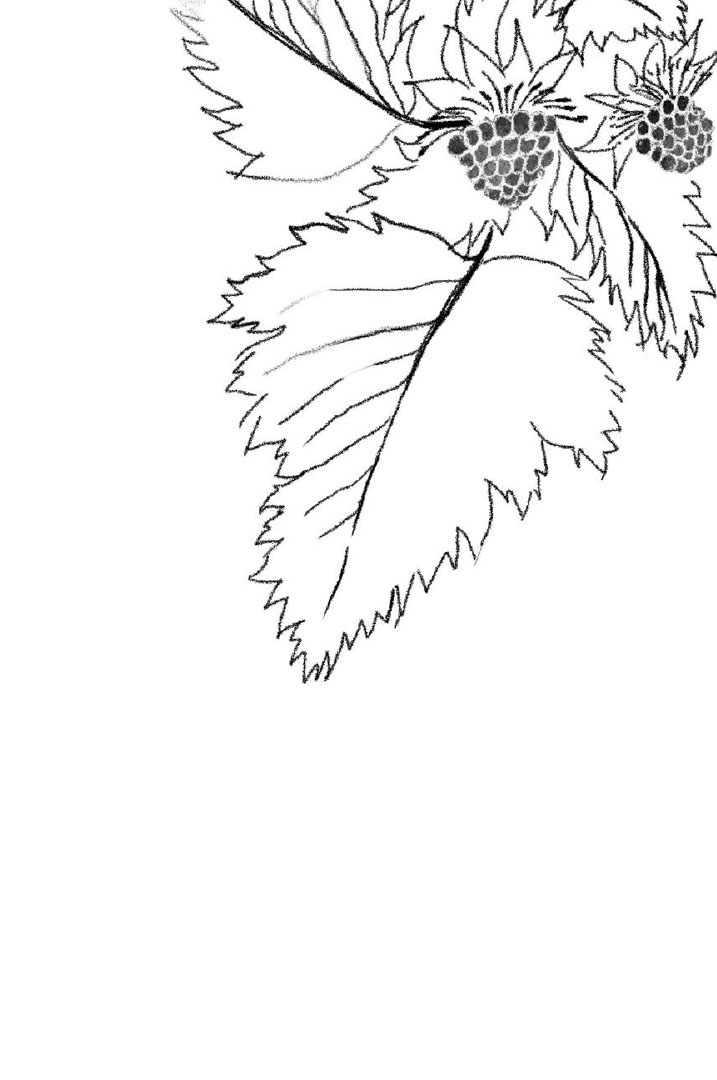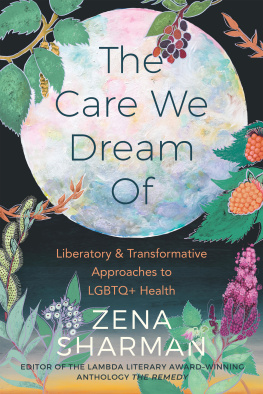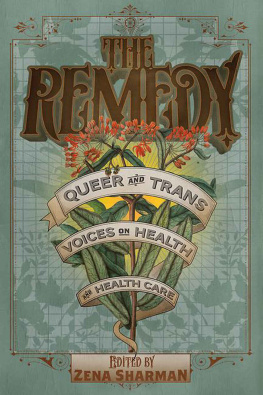Contents
Page List
Guide

The Care We Dream Of
The Care We Dream Of
Liberatory & Transformative Approaches to LGBTQ+ Health
zena sharman

arsenal pulp press
vancouver
THE CARE WE DREAM OF
Copyright 2021 by Zena Sharman
Essays and poems copyright 2021 by individual contributors
All rights reserved. No part of this book may be reproduced in any part by any meansgraphic, electronic, or mechanicalwithout the prior written permission of the publisher, except by a reviewer, who may use brief excerpts in a review, or in the case of photocopying in Canada, a licence from Access Copyright.
ARSENAL PULP PRESS
Suite 202 211 East Georgia St.
Vancouver, BC V6A 1Z6
Canada
arsenalpulp.com
The publisher gratefully acknowledges the support of the Canada Council for the Arts and the British Columbia Arts Council for its publishing program, and the Government of Canada, and the Government of British Columbia (through the Book Publishing Tax Credit Program), for its publishing activities.

Arsenal Pulp Press acknowledges the xmkym (Musqueam), Swxw7mesh (Squamish), and slilwta (Tsleil-Waututh) Nations, custodians of the traditional, ancestral, and unceded territories where our office is located. We pay respect to their histories, traditions, and continuous living cultures and commit to accountability, respectful relations, and friendship.
Cover image description: The cover art of The Care We Dream Of is a painting by Tiar Lani Kela Jung. The painting depicts a large bright moon with textures of pale yellows, pinks, blues, and purples mixed in with white. The background is a faded dark sky that lightens into orange by the bottom of the cover. Various plants local to the Pacific Northwest, including berries, flowers, and greenery, frame the moon. Purple berries drape down from the top of the cover, slightly overlapping the books title, which is placed inside the moon in a calm, thin sans serif font. The subtitle is below the moon, in orange, against the dark night sky. The authors name, Zena Sharman, appears in a light cream over some of the foliage along the bottom of the cover. Below her name is dark grey text that reads, Editor of the Lambda Literary Awardwinning anthology The Remedy.
Cover and text design by Jazmin Welch
Cover and interior illustrations by Tiar Lani Kela Jung
Edited by Shirarose Wilensky
Copy edited by Erin Parker
Proofread by Alison Strobel
Printed and bound in Canada
Library and Archives Canada Cataloguing in Publication:
Title: The care we dream of : liberatory & transformative approaches to LGBTQ+ health / Zena Sharman.
Names: Sharman, Zena, 1979 editor.
Description: Includes bibliographical references.
Identifiers: Canadiana (print) 2021022746X | Canadiana (ebook) 20210232374 | ISBN 9781551528601 (softcover) | ISBN 9781551528618 (HTML)
Subjects: LCSH: Sexual minoritiesMedical care. | LCSH: Sexual minoritiesHealth and hygiene. | LCSH: Sexual minoritiesMedical careLiterary collections. | LCSH: Sexual minoritiesHealth and hygieneLiterary collections. | LCSH: Sexual minorities writings, Canadian. | CSH: Canadian literature (English)21st century.
Classification: LCC RA564.9.S49 C37 2021 | DDC 362.1086/6dc23
the space is woven. multicolored bright patterns lovingly threaded together. when you touch them, you know that each piece was worn by someone who believed in this quilted moment, this soft vibrant welcoming space.
and you can feel that the hands that stitched this together stitched it with love and desire, creativity and connection. they laughed sometimes when they were stitching and cried sometimes as the memories came through. they were grateful to transform each memory into love. you can feel their presence as you put the fabric in your hands. as you begin weaving now.
ALEXIS PAULINE GUMBS, M ARCHIVE: AFTER THE END OF THE WORLD
A minimal definition of community might be this: folks who are reweaving.
HIL MALATINO, TRANS CARE

contents
- Zena Sharman
- Jillian Christmas
- Zena Sharman
- Interview with Dawn Serra
- Leah Lakshmi Piepzna-Samarasinha
- Zena Sharman
- jaye simpson
- Alexander McClelland and Zo Dodd
- Zena Sharman
- Interview with Ronica Mukerjee
- Sand C. Chang
- Interview with Anita Durt OShea
- Kai Cheng Thom
- Carly Boyce
- Blyth Barnow
- Zena Sharman
- Interview with Sean Saifa Wall
- Zena Sharman
- Interview with Hannah Kia
- Joshua Wales
- Zena Sharman

Introduction
Zena Sharman
This book began from a question: What if queer and trans people loved going to the doctor?
Questions can be a portal into possibilities we hadnt yet imagined. This deceptively simple questionwhat if queer and trans people loved going to the doctor?was a kind of portal for me, because of how it gestured toward an audaciously different set of conditions from the ones were in now.
When I ask other queer and trans people this question they usually laugh, roll their eyes, or make a face that tells me just how unfathomable the idea of loving going to the doctor is to them. But then something changes. As they contemplate what it would mean to feel this way, their facial expressions shift. Their eyes light up and their bodies relax a little. I know because mine does, too. Theres something potent about this moment of shared imagining, even if we arent picturing the same thing.
Think about it: What if you loved going to the doctor?
Im curious: Whats the first thing that comes to mind when you contemplate this question? How does it feel in your body? Maybe youre already rolling your eyes at me or you instinctively put up a shield to protect yourself from potential harm. Sit with this question for a moment longer if you can. What kinds of possibilities begin to unfold for you as you let yourself imagine what it would take to be able to answer yes?
When I asked myself this question, it led me to other questions: What if queer and trans people had the resources we needed to create and sustain our own community-led forms of care and healing in ways that are expansively available to everyone who wants them? What if we could always trust in getting health care that felt good, accessible, and even pleasurable, wherever and whenever we needed it? What if it felt safe enough to bring our whole selves into the process? What if health care felt healing and helped us flourish?
What if all health care providers and healers genuinely honoured and valued queer and trans people, worked collaboratively with us, and trusted in our expert knowledge of our own bodies? What if health and healing were widely understood not as individual responsibilities but as processes that happen collectively in communities? What if all health care and healing was built on a foundation of antiracism and disability justice? What if the care we received was rooted in a commitment to our liberation and the liberation of all people?










